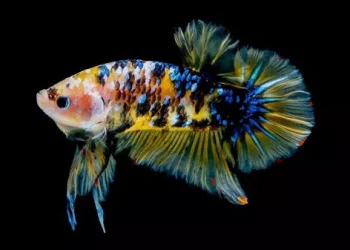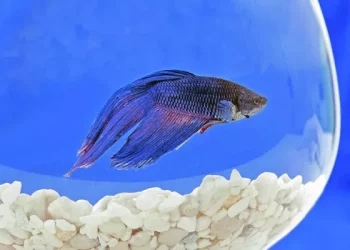Betta fish, with their stunning colors and graceful fins, are among the most popular pets worldwide. They bring joy and beauty to our homes. But just like any other pet, bettas have specific dietary needs that must be met for them to thrive. If you’re a proud betta owner or thinking about becoming one, you might be wondering: what is the best pellet food for betta fish? This article will dive deep into the fascinating world of betta nutrition, unraveling the mystery of the perfect pellet while sprinkling in some humor along the way.
Understanding Betta Fish and Their Diet
Before we get into the nitty-gritty of pellets, let’s take a moment to appreciate the magnificent betta fish. Also known as Siamese fighting fish, these beauties are native to the warm waters of Southeast Asia. Bettas are known for their vibrant colors and long, flowing fins that resemble a delicate ballet performance underwater. But don’t let their grace fool you; they have a fierce attitude and can be territorial.
Bettas are carnivorous by nature, which means they thrive on a diet rich in protein. In their natural habitat, they feast on insects, larvae, and small crustaceans. Understanding this natural diet is crucial for choosing the best pellet food for your betta fish. A good betta diet mimics what they would eat in the wild, ensuring they receive the nutrients they need to stay healthy, vibrant, and active.
Why Choose Pellet Food?
Pellet food is a popular choice among betta owners for several reasons:
Convenience: Pellets are easy to store and dispense. You don’t have to worry about preparing live food or freezing brine shrimp. A quick shake of the container, and you’re ready to feed your fish!
Nutritional Balance: High-quality betta pellets are formulated to provide a balanced diet. They often contain the right mix of proteins, fats, vitamins, and minerals that bettas need to thrive.
Reduced Waste: Unlike live food, which can lead to excess waste in your aquarium, pellets typically create less mess. This means less cleaning for you!
Variety of Options: The market is flooded with different pellet foods designed specifically for bettas. This variety allows you to choose a product that suits your fish’s preferences and dietary needs.
What to Look for in Betta Pellets
When shopping for betta pellets, it’s essential to know what to look for. Not all pellets are created equal, and your betta deserves the best! Here are some key factors to consider:
Protein Content
Since bettas are carnivorous, protein is the star of the show. Look for pellets with a high protein content—around 30-40% is ideal. Ingredients like fish meal, shrimp meal, or whole fish should be at the top of the ingredient list. Avoid pellets that contain fillers like corn or wheat as the primary ingredients, as these won’t provide the necessary nutrients your betta needs.
Balanced Nutrients
In addition to protein, a good betta pellet should include a balanced mix of fats, vitamins, and minerals. Essential fatty acids are important for your betta’s health, so check for ingredients like fish oil or omega fatty acids. Vitamins A, C, and E support your fish’s immune system and overall health, while minerals help with bone and scale development.
Size Matters
Bettas have small mouths, so it’s crucial to choose pellets that are appropriately sized for them. Look for small or mini pellets designed specifically for bettas. They should be easy for your fish to consume without any struggle. If the pellets are too large, your betta may end up with a “fishy” case of the munchies, leading to frustration and potential health issues.
Floating vs. Sinking Pellets
Bettas are known to be surface feeders, so you might want to consider floating pellets. These pellets will stay at the top of the water, making it easier for your betta to grab a bite. However, some bettas prefer sinking pellets, so it may take some experimentation to find out what your fish prefers.
Reputation of the Brand
Choose reputable brands that specialize in fish food. Companies like Hikari, Tetra, and Omega One are well-known for producing high-quality betta pellets. Look for reviews or ask fellow betta owners about their experiences with different brands.
Recommended Betta Pellets
Now that we know what to look for in betta pellets, let’s explore some of the best options on the market. Here are some top picks that have received rave reviews from betta owners:
Hikari Betta Bio-Gold
Hikari Betta Bio-Gold is a popular choice among betta enthusiasts. These pellets are formulated with high protein content (about 36%), making them a perfect choice for your carnivorous fish. The pellets are small and sink slowly, allowing your betta to enjoy their meal without any rush. They also contain added vitamins and minerals to boost your betta’s immune system.
Tetra BettaMin Floating Mini Pellets
Tetra BettaMin Floating Mini Pellets are another excellent option for your betta fish. These pellets are designed to float, making them easy for your fish to catch. They contain a balanced mix of proteins, vitamins, and minerals, ensuring that your betta receives all the nutrients they need. Plus, the small size is perfect for their tiny mouths!
Omega One Betta Buffet Pellets
Omega One Betta Buffet Pellets are packed with high-quality ingredients and contain about 40% protein. These pellets are designed to float, and they contain whole fish and shrimp as primary ingredients. Omega One is known for its commitment to using fresh seafood, so you can trust that you’re feeding your betta a nutritious diet.
New Life Spectrum Betta Formula
New Life Spectrum Betta Formula is another fantastic choice for discerning betta owners. These pellets are made with high-quality fish meal, spirulina, and a blend of essential vitamins and minerals. The pellets are designed to sink slowly, catering to the natural feeding behavior of bettas. Plus, they are free from artificial colors and preservatives, making them a wholesome option for your fish.
Aquatic Foods Betta Food Pellets
Aquatic Foods Betta Food Pellets are a great budget-friendly option. These pellets provide a balanced diet with high protein content, and they float on the surface for easy access. They’re also designed to enhance color and promote vibrant health, which is always a plus!
How to Feed Your Betta Fish
Feeding your betta fish the right amount of pellets is crucial for their health. Overfeeding can lead to obesity and poor water quality, while underfeeding can result in malnutrition. Here are some feeding tips to ensure your betta stays healthy:
Feed Small Amounts: Offer your betta 2-3 pellets at a time, once or twice a day. Monitor how much they eat, and adjust accordingly. If there are uneaten pellets after a few minutes, you may be overfeeding.
Variety is Key: While pellets should be the mainstay of your betta’s diet, it’s also essential to incorporate variety. Consider offering live or frozen food, like brine shrimp or daphnia, as occasional treats. This not only keeps your betta engaged but also mimics their natural diet.
Be Consistent: Establish a feeding schedule and stick to it. Bettas thrive on routine, and feeding them at the same time each day can help them feel secure and happy.
Avoid Overfeeding: Overfeeding can lead to health issues and poor water quality. Bettas can go for a day or two without food if necessary, so don’t worry if you miss a feeding.
See Also: How Long Do Glow Betta Fish Live?
Monitor Health: Keep an eye on your betta’s health and behavior. If you notice any changes, such as lethargy or refusal to eat, it could be a sign of health issues. Consult your veterinarian if you have any concerns.
The Impact of Diet on Betta Health
What your betta eats has a direct impact on their health and well-being. A well-balanced diet contributes to vibrant colors, active behavior, and a strong immune system. Here are some benefits of feeding your betta high-quality pellets:
Vibrant Colors: A diet rich in quality proteins and nutrients enhances the natural colors of your betta fish. You’ll be amazed at how beautiful your betta can look with the right food!
Healthy Growth: Young bettas need proper nutrition to grow and develop healthily. High-quality pellets provide the essential nutrients needed for growth.
Improved Immune System: A balanced diet supports your betta’s immune system, helping them fend off diseases and infections.
Active Lifestyle: Betta fish are known for their playful and active behavior. A nutritious diet keeps them energetic and engaged, ensuring they swim around their tank like the little show-offs they are.
Common Mistakes When Feeding Betta Fish
Even the best pet owners can make mistakes when it comes to feeding their bettas. Here are some common pitfalls to avoid:
Ignoring Water Quality: Overfeeding can lead to excess waste in the tank, which can harm water quality. Always monitor your water parameters and perform regular maintenance to keep the environment clean.
Feeding Only Pellets: While pellets are great, a diet consisting solely of pellets can lead to nutritional deficiencies. Mix in some variety, including live or frozen foods, to keep your betta healthy and happy.
Not Reading Labels: Not all pellets are created equal. Always read the labels to ensure you’re selecting high-quality options. Ingredients matter, so don’t settle for fillers or low-quality foods.
Feeding Too Much: It can be tempting to overfeed your fish, especially when they beg for food. Resist the urge! Stick to the recommended feeding amounts to prevent obesity and health issues.
Neglecting Freshness: Fish food can go stale. Always check the expiration date and store pellets in a cool, dry place to ensure they stay fresh.
Fun Facts About Betta Fish
To wrap things up, let’s sprinkle in some fun facts about betta fish that might surprise you:
Colorful Personalities: Bettas come in a variety of colors and patterns. You can find them in shades of blue, red, green, and even multicolored!
Fighting Fish: Bettas are called “fighting fish” for a reason. Males are territorial and will fight each other if housed together. Always keep male bettas separated to avoid fights!
Bubbles of Joy: Bettas can create bubble nests. These are clusters of bubbles made from saliva, and they serve as a place for the male to protect his eggs after breeding.
Breathing Style: Bettas have a labyrinth organ that allows them to breathe air directly from the surface. This is why they often swim up to gulp air!
Long Lifespan: With proper care, bettas can live for three to five years, and some have been known to live even longer!
Conclusion
In conclusion, choosing the best pellet food for your betta fish is crucial for their health and happiness. High-quality pellets, rich in protein and balanced nutrients, will keep your betta vibrant and active. Remember to monitor their feeding habits, maintain water quality, and mix in some variety for a well-rounded diet.
With a little attention and care, you’ll have a happy betta fish that dazzles in your aquarium, reminding you every day why you fell in love with these colorful creatures. Happy feeding, and may your bettas swim gracefully through their watery ballet!
Related Topics:























